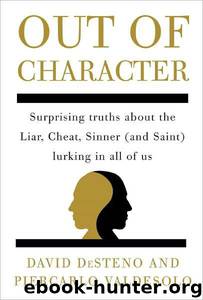Out of Character: Surprising Truths About the Liar, Cheat, Sinner (And Saint) Lurking in All of Us by David DeSteno; Piercarlo Valdesolo

Author:David DeSteno; Piercarlo Valdesolo
Language: eng
Format: mobi
Tags: Conduct of Life, Psychology, Character, Psychological Aspects, Applied Psychology, General, Self-Help, Social Psychology, Conduct of Life - Psychological Aspects, Personality
ISBN: 9780307717771
Publisher: Crown Publishing Group
Published: 2011-05-01T00:00:00+00:00
Mirror, mirror on the wall, who’s the worthiest of them all?
A growing body of evidence suggests that an important factor underlying whether we show someone compassion or cruelty is the person’s perceived similarity to us. It should take little introspection to realize that we feel the pain of those with whom we seem to share some commonalities. Countless studies have demonstrated that we not only consistently show more compassion to those we deem “like us,” but that the mind makes judgments of similarity quite rapidly and spontaneously.2 You can see how this plays out in a setting such as a battlefield, where the opposing sides hail from different nations or tribes, speak different languages, wear different uniforms, and stand on opposite sides of clearly drawn (both physically and ideologically) lines. Such differences are likely why it was so easy for the British soldiers in our example to bludgeon and shoot their German counterparts in the first place. Those dastardly Huns, the British reasoned, were nothing like them. Yet, in the light of the Christmas candles, this “like us”/ “not like us” distinction got a little more muddled. Suddenly these enemies seemed more similar; they were fellow Christians who celebrated the same traditions and sang the same songs. And once they got to talking to one another, their differences receded even further. They weren’t just “dastardly Huns”; they were husbands and fathers, just like the British soldiers were.
These same psychological mechanisms were at work in the case of the warring factions of the Ivory Coast, for whom it took the unifying force of World Cup soccer to allow them to see their reflection in each other. Same goes for the people who came out in droves to help the victims of 9/11, Katrina, and the Haitian earthquake—the crises shifted their focus away from all their squabbles and differences and onto their shared identity as human beings. But once the worst was over and they slipped back into their “us/them” mentality, their compassion swiftly abated. It only takes a quick glance at the headlines to see that most conflicts—be they national, political, religious, or personal—often come down to this very simple and automatic “like us”/ “not like us” split.
How can such a basic distinction flip the switch between our most noble impulses and our most vicious ones? One answer lies in our evolutionary wiring. In the middle of the twentieth century, scientists were having a few problems explaining certain acts of altruism and compassion. After all, wasn’t evolution all about selfishness and one’s own survival? Once natural selection was understood to operate at the level of the gene, meaning that evolution not only favored behaviors that ensured we’d survive but also those that ensured we’d pass our genes to future generations, altruism toward family members was easy enough to explain. But what about the preponderance of evidence suggesting that we would also act altruistically toward perfect strangers? It was puzzling until the evolutionary biologist Robert Trivers proposed a theory for what he called reciprocal altruism.
Download
This site does not store any files on its server. We only index and link to content provided by other sites. Please contact the content providers to delete copyright contents if any and email us, we'll remove relevant links or contents immediately.
The Art of Thinking Clearly by Rolf Dobelli(9916)
Mindhunter: Inside the FBI's Elite Serial Crime Unit by John E. Douglas & Mark Olshaker(8702)
Change Your Questions, Change Your Life by Marilee Adams(7378)
Nudge - Improving Decisions about Health, Wealth, and Happiness by Thaler Sunstein(7245)
Mastermind: How to Think Like Sherlock Holmes by Maria Konnikova(6937)
The Power of Now: A Guide to Spiritual Enlightenment by Eckhart Tolle(5333)
Men In Love by Nancy Friday(4964)
Altered Sensations by David Pantalony(4867)
Factfulness: Ten Reasons We're Wrong About the World – and Why Things Are Better Than You Think by Hans Rosling(4489)
The Confidence Code by Katty Kay(4040)
Thinking in Bets by Annie Duke(3998)
Man and His Symbols by Carl Gustav Jung(3845)
The Worm at the Core by Sheldon Solomon(3325)
Why Buddhism is True by Robert Wright(3284)
Three Women by Lisa Taddeo(3278)
Liar's Poker by Michael Lewis(3227)
Descartes' Error by Antonio Damasio(3166)
The Inner Life of Animals by Peter Wohlleben(3099)
The Power of Mindful Learning by Ellen J. Langer(3075)
